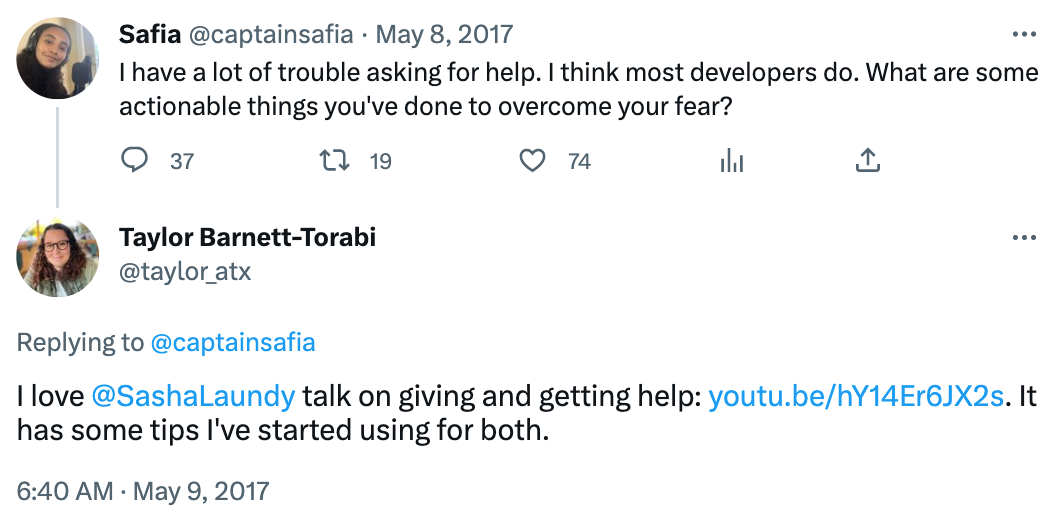I gave this talk at Pycon in Montreal in 2015. I thought a few dozen people would see it live and maybe a couple hundred would watch the video. But almost ten years later, it's been viewed 14,000+ times on Youtube.
More importantly, I've heard so many stories about it having the impact I hoped for. I've heard from managers showing it to teams to start productive, blameless conversations with prickly team leads. I've heard from senior devs watching it, a little horrified to learn they've been much more discouraging than they realized. And it's been added to the curricula of several bootcamps to prepare people for their first tech roles. And, in the highest compliment of all, people have told me they've watched it multiple times! Wow.
It was extremely difficult to write, I'm really proud of it, and realized I never wrote it up. So nine years later, here you go.
Confusion is a sign you're about to learn something new.
Origin story
This talk is decades of professional and personal experience packed into 25 minutes. I wrote it from a place of both frustration and hope, and have been really stunned by its reach over the last nine years.
I'd taught and learned in pretty hostile intellectual cultures. I saw how hard it is to be new to something and still confident, and how easy it is for experienced people to unthinkingly be alienating and discouraging.
I also saw—from both sides—how tiny changes could make a profound impact. It's not hard. It's not expensive. But it changes your culture, and your culture is everything. I'd accumulated dozens of tips and was hungry to have more people use them, knowing it would nudge the world toward a better place.
So I submitted the talk proposal (never expecting it to get accepted, let alone by the biggest Python conference in the world) and then struggled for months to wrestle it into a coherent talk. The sheer number of things I wanted to say made structure challenging. Plus my message was nuanced—there is a very fine line between scolding and empowering. I gave and rewrote this talk three times, and I'm proud of how it came out!
The talk
Talk structure
This was a tricky one to structure! It ended up organized in three sections:
- (purple slides) foundational concepts. What this looks like and how profound the impact is. How giving and getting help is a crucial part of your culture, and a competitive advantage. What's going on in peoples' heads that they'll never say out loud.
- (blue slides) my five top tips for asking for help
- (red slides) my five top tips for giving help
The talk is carefully crafted to be watched in order. You could just listen to the audio as my approach to slides is pretty minimal. But I don't recommend skipping the purple section, just reading a transcript, nor using tools to summarize it, as you won't get as much out of it. I worked very hard to make it worth your time.
Why call it "Your Brain's API"?
API stands for application programming interface. Roughly speaking, it's the interface that lets servers—computers that are physically locked away in different rooms—talk to each other to share information and get things done. Our brains are locked away in different skulls, and this talk is about how they can better communicate with each other.
Selected tweets









And even more tweets:


















If you got something out of this talk, I'm no longer on Twitter, but I'd still love to hear about it!
How I Prep in the 24 Hours Before Giving a Conference Talk
Last week, I gave a talk at Strata, O’Reilly’s data science conference. Every time I give a talk I get a little bit better at it. I’ve seen a lot about how to propose talks and prepare slides, but less written about preparing right before your talk. Here’s what I’ve
 Sasha
Sasha

Like this post? Sign up to get notified